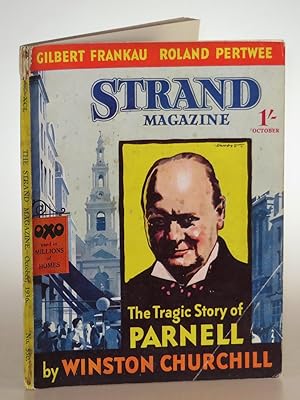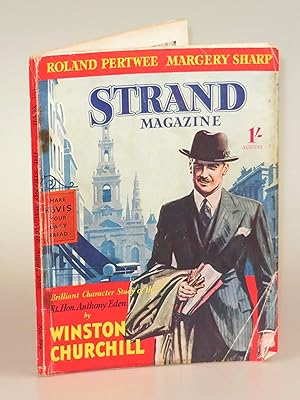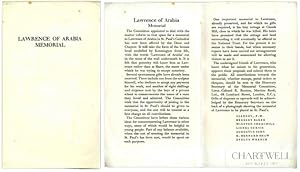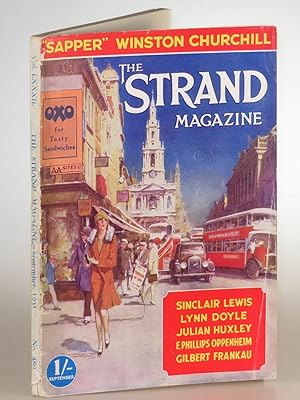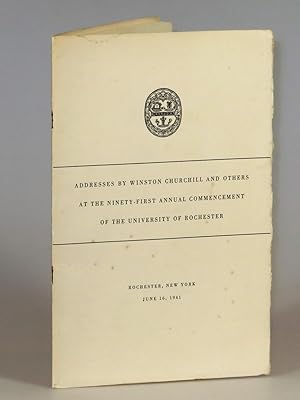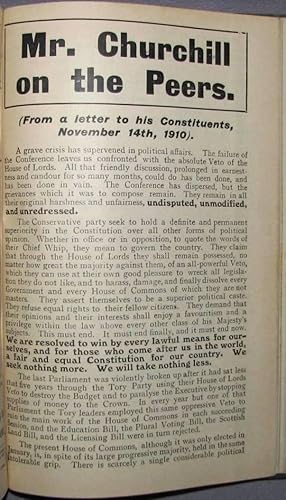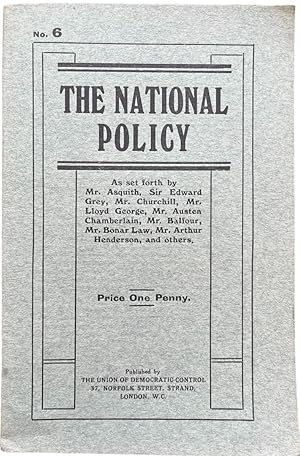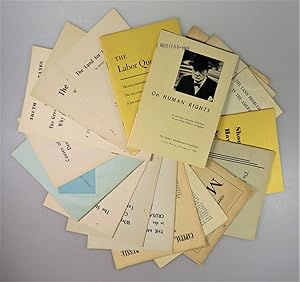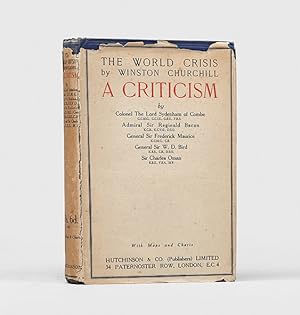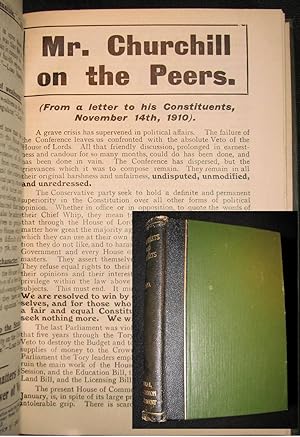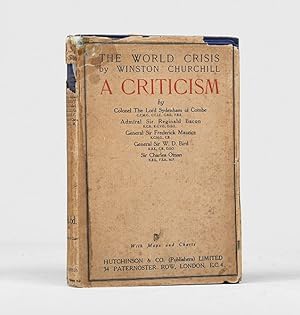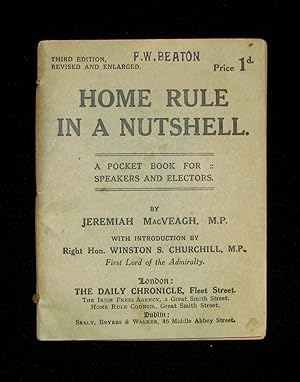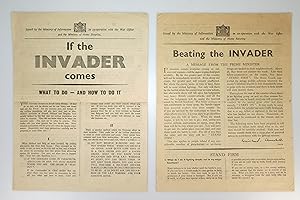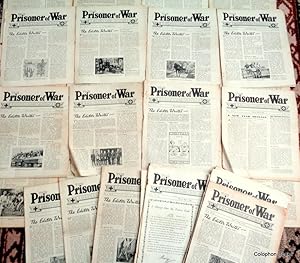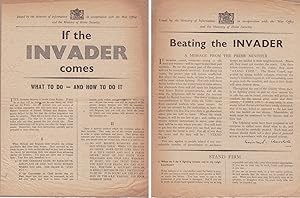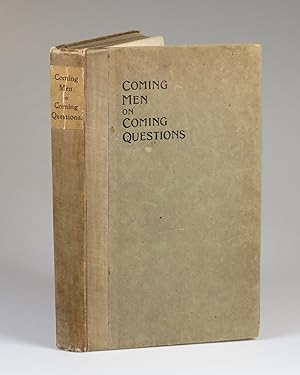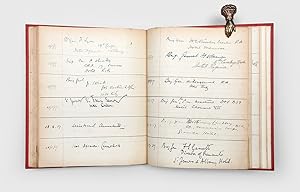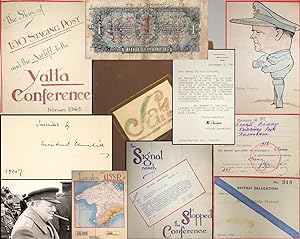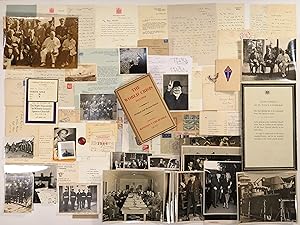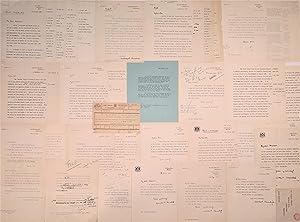WINSTON S CHURCHILL AND OTHERS (22 Ergebnisse)
Produktart
- Alle Produktarten
- Bücher (21)
- Magazine & Zeitschriften (1)
- Comics
- Noten
- Kunst, Grafik & Poster
- Fotografien
- Karten
-
Manuskripte &
Papierantiquitäten
Zustand
- Alle
- Neu
- Antiquarisch/Gebraucht
Einband
Weitere Eigenschaften
- Erstausgabe (12)
- Signiert (3)
- Schutzumschlag (1)
- Angebotsfoto (21)
- Kein Print-on-Demand
Land des Verkäufers
Verkäuferbewertung
-
Illustrated, November 24th 1951
Verlag: Odhams, London, 1951
Anbieter: Cotswold Internet Books, Cheltenham, Vereinigtes Königreich
Contains Part Two of Churchill's 'My Story', & an article about Janette Scott. Staples rusty; short tears in edge of back cover; small hole in front cover. Used - Good. Good stapled magazine.
-
Pictorial Weekly, nos.1644 - 1655
Verlag: Amalgamated Press, 1930
Anbieter: Cotswold Internet Books, Cheltenham, Vereinigtes Königreich
12 issues, from 6 Dec 1930 - 21 Feb 1931, amateurishly bound with front & back covers (except last issue) in blue/black cloth, with hand-written title page & index. Some issues slightly trimmed at bottom edge. Includes 4pp article by Churchill 'My most thrilling moment' "specially prepared for this journal"; 5 short stories by George Goodchild featuring Inch of CID. Used - Good. Good bound magzines.
-
The Tragic Story of Parnell in The Strand Magazine, October 1936
Verlag: George Newnes, Ltd., London, 1936
Anbieter: Churchill Book Collector ABAA/ILAB/IOBA, San Diego, CA, USA
Erstausgabe
Periodical. First edition. This October, 1936 issue of The Strand Magazine (Vol. XCI, No. 550) contains the first published appearance of Winston Churchill s portrait of Irish politician Charles Stewart Parnell (1846-1891). Here Churchill paints a picture of the life and career of one of the most powerful politicians of the Victorian era as a "tale which constituted all the elements of a Greek tragedy." Parnell had a long and successful career in Irish politics; at his height, Parnell as leader of the Irish Parliamentary Party was nearing an agreement on Irish Home Rule with Prime Minister Gladstone. However, Parnell was brought down by the scandal catalyzed by the revelation of a longstanding affair with a married woman, Katherine O Shea. Churchill is sympathetic, writing, "as he had previously sacrificed all for Ireland, so, when the moment of choice came, he sacrificed all, even Ireland, for love." In 1936 a politician driven out of office would have been of understandable interest for Churchill. The 1930s were a decade out of power and out of favor that would be known later as Churchill s "wilderness years", during which his persistent warnings and predictions about Nazi Germany went substantially unheeded. Churchill s article, prominently advertised with a colorful illustration of its author filling the front cover, spans pages 600-610 and is illustrated with cartoons and drawings depicting Parnell s life. This magazine approaches very good condition, particularly considering the inherent fragility of the format. The covers are bright, clean, complete, and firmly attached, with only minor wear to the extremities and a crease to the lower front corner. The spine is bright and legible with some minor wear overall and one inch of loss to the head. The contents are complete, clean, and bright with no markings or spotting. A small typewritten piece of paper is tipped onto the first page of advertisements. This essay would be later collected in the 1938 revised and expanded edition of Great Contemporaries at pages 345-359. Bibliographic reference: Cohen C509, Woods C315.
-
The Rt. Hon. Anthony Eden in The Strand Magazine, August 1939
Verlag: George Newnes, Ltd., London, 1939
Anbieter: Churchill Book Collector ABAA/ILAB/IOBA, San Diego, CA, USA
Erstausgabe
Periodical. First edition. This August, 1939 issue of The Strand Magazine (Vol. XCVII, No. 584) contains the first published appearance of Winston Churchill s portrait of his eventual successor as Prime Minister, Anthony Eden (1897-1977). Educated at Eton and Christ Church Oxford, Eden served on the western front from 1915-1918 and was awarded the Military Cross. He served as a Conservative Member of Parliament from 1923-1957. His posts included Parliamentary Under-Secretary, Foreign Office (1931-1933), Lord Privy Seal (1934-35), Minister for League of Nations Affairs (1935), and Foreign Secretary (1935-38, 1940-1945, and 1951-1955).Churchill s article, prominently advertised with an illustration of its subject on the front cover, fills pages 258-66 and is illustrated by numerous photographs of Eden. This magazine approaches very good condition, particularly considering the inherent fragility of the format. The covers are bright, complete, and firmly attached, and the spine is uncreased. The covers show modest wear to hinges and extremities and some creasing to the lower front cover corner. Two binding staples have corroded affecting the adjacent paper on the covers. The contents are complete. The sole previous ownership mark is a printed and small, inscrutable, hand-annotated label affixed to p.1. This article was subsequently included in Collected Essays, Vol. III at pages 340-7.Eden famously resigned his Foreign Secretary post on 20 February 1938 in protest of the Government's appeasement policies. Less than one year after Eden s resignation the future wartime Prime Minister drew this character study of his eventual successor. Though Churchill was a vocal and persistent opponent of the strategy of appeasement, he is here careful to avoid taking a side regarding the Eden resignation. "I should be trenching too much upon burning controversies if I were to attempt here to express an opinion upon [Eden s resignation]". Nevertheless, he closes this essay praising Eden for his "readiness to sacrifice unhesitatingly his great position for the sake of his convictions, [that] even the most hostile critic must recognize the strong fibre of his nature, and the resolute purpose of his mind."In later years Churchill was much more explicit in his appraisal of Eden s resignation. In his WWII memoirs he wrote: ".on this night of February 20, 1938. sleep deserted me. There seemed one strong young figure standing up against long, dismal, drawling tides of drift and surrender, of wrong measurements and feeble impulses. he seemed to me at this moment to embody the life-hope of the British nation. Now he was gone." (The Gathering Storm, pp. 257-8)Eden's premiership, long-delayed while waiting for Churchill to relinquish his own grip on the premiership, was fraught with challenge, including the Suez Crisis, and revealed Eden prone to demonstrate "irascibility, his inability at times to delegate, and his touchiness in the face of criticism." Nonetheless, the passage of time sees Eden "increasingly recognized as a serious and patriotic figure who worked under the most appalling pressure for nearly three decades at the front line of British and world politics."Reference: Cohen C643, Woods C430.
-
LAWRENCE OF ARABIA MEMORIAL -Rare Pamphlet-
Verlag: Privately Published, Not Given, 1937
Anbieter: CHARTWELL BOOKSELLERS, NEW YORK, NY, USA
Pamphlet. Zustand: Very Good. First Edition/Only Printing. Folded single-sheet leaflet appealing for funds for a T.E. Lawrence memorial in St. Paul's Cathedral, under the names of Winston Churchill and George Bernard Shaw, among others. A very good copy of this scarce item.
-
Some Election Memories in The Strand Magazine, September 1931
Verlag: George Newnes, Ltd., London, 1931
Anbieter: Churchill Book Collector ABAA/ILAB/IOBA, San Diego, CA, USA
Erstausgabe
Periodical. First edition. This September, 1931 issue of The Strand Magazine (Vol. LXXXI, No. 484) contains the first appearance of Winston Churchill s article "Some Election Memories", published prior to its inclusion in Thoughts and Adventures. In this article Churchill begins by asserting his well-earned authority on English elections. "In fact", he writes, "I have devoted one day in thirty of my whole adult life to these strange experiences." What follows is at once a unique lens through which Churchill describes Britain s evolution in the first decades of the 20th century ("When I first began this had to be done in a two-horse landau, at about seven miles an hour.") and a personal account of his early political career and its hard-fought victories and defeats. At the time of this article s publication in 1931 Churchill was in the midst of political isolation, his Conservative Party out of power and himself increasingly out of favor within his own Party. This period was a time for reminiscence; in 1931 Churchill published the final volume of his history of the First World War and the year prior he published his autobiography, My Early Life. As far as he could see, his long political arc was descending. Here he concludes his musings, "This is certainly as much as should satisfy anyone, and makes me earnestly hope that I have now found a resting-place amid the glades of Epping which will last me as long as I am concerned with mundane affairs." Of course, it would not be long before the affairs of the world would draw Churchill out of his "resting-place" and into his far from "mundane" role as Britain s indispensible, iconic wartime Prime Minister. Churchill s article, prominently advertised on a red banner spanning the magazine s front cover, fills pages 236-47 and is illustrated by photographs, drawings, and political cartoons from throughout his early political career. This magazine is in good plus condition, particularly considering the inherent fragility of the format. The covers are bright, clean, complete, and firmly attached, with only minor wear to the extremities and a crease to the lower front corner that extends up the cover s fore-edge. The spine is legible with some wear overall and a half inch loss of the blank paper at the spine s foot. The contents are complete, clean, and bright with no markings or spotting. This article, in a slightly edited form, was later collected in 1932 s Thoughts and Adventure at pages 201-15. Bibliographic reference: Cohen C359, Woods C177.
-
Addresses by Winston Churchill and Others at the Ninety-First Annual Commencement of the University of Rochester The first published appearance of Churchill's 16 June 1941 wartime broadcast address to the University of Rochester, his mother's birth city
Verlag: University of Rochester, Rochester, New York, 1941
Anbieter: Churchill Book Collector ABAA/ILAB/IOBA, San Diego, CA, USA
Erstausgabe
Paperback. First edition. This scarce pamphlet is the first published appearance of Winston S. Churchill's speech of 16 June 1941, early in Churchill s Second World War premiership and nearly half a year before the United States formally entered the war. The speech was broadcast from 10 Downing Street on the occasion of Churchill receiving an Honorary Degree of Laws from the New York State's University of Rochester. Churchill had assumed the Premiership just a year earlier on 10 May 1940. By 16 June 1941, Churchill had led his nation for a frightful, solitary year since the fall of France. Britain would continue to stand alone against Hitler's Germany until the United States formally entered the Second World War after the 7 December 1941 attack on Pearl Harbor.Courting American empathy and support was of critical importance. In particular, severe merchant shipping losses to German U-Boats in April and May of 1941 were a spur "to press continually for a wider American contribution to Britain's war effort." (Gilbert, Vol. VI, p.111) Churchill's speeches conveyed the political determination of the British government and steadfastness of the British people to an American nation not yet fully engaged in the war. Given that Churchill s mother was born in Rochester and Franklin Delano Roosevelt had served as Governor of New York State, this Broadcast address to a New York University, which might otherwise seem obscure, was a timely opportunity.In his speech Churchill spoke of "sense of kinship and of unity", and of his ancestral connection to Rochester. Nearly every sentence of Churchill's remarks limned common heritage, values, and purpose, all the while conveying British resolve to prevail: "For more than a year, we British have stood alone uplifted by your sympathy and respect, sustained by our own unconquerable will power and by the increasing growth and hopes of your massive aid. Whatever happens, we shall endure to the end." This speech was eventually published in His Complete Speeches as "The Old Lion".The title comes from the speech's penultimate paragraph: Now the old lion. stands alone against hunters who are armed with deadly weapons and impelled by desperate and destructive rage." The speech concludes striking the balance between Britain's resolve and urgent need: ".time is short. Every month that passes adds to the length and the perils of the journey that will have to be made. United we can save and guide the world." Clearly, the intended American audience was broader than Rochester. Four days later, on 20 June, Churchill telegraphed Roosevelt thanking him for establishment of trans-Atlantic "Ferry Service" using American Army pilots and American-manned staging posts with servicing facilities and assuring the President that "There will be no weakening here."The pamphlet measures 9.25 x 6 inches (23.5 x 15.25 cm), bound in wire-stitched, laid watermarked card wraps, both the front wrap and contents with untrimmed edges. The contents number 23 pages. Churchill's full address is printed at pages 7-9, preceded by his portrait photograph at page 6. The balance of the pamphlet contains a Foreword, the degree presentation by University President Alan Valentine, excerpts from an address by Eve Curie (daughter of Marie Curie), excerpts from an address by Robert P. Patterson (Roosevelt's Under Secretary of War), and a list of honorary degrees conferred in 1941.Condition is very good plus. The covers are complete and firmly attached, both binding staples rusted but tight. The covers show light soiling and spotting. This is an elusive item. This copy survived proximate to its source, coming to us courtesy of an upstate Upstate New York bookseller.Reference: Cohen D80, Woods D(b)53/1.
-
Mr. Churchill on the Peers by Winston S. Churchill, original 1910 leaflet, bound in Pamphlets & Leaflets for 1910, Being the Publications for the Year of the Liberal Publication Department
Verlag: The Liberal Publication Department, London, 1911
Anbieter: Churchill Book Collector ABAA/ILAB/IOBA, San Diego, CA, USA
Erstausgabe
Hardcover. First edition, only printing. Contained in this bound volume is the first edition, only printing of this scarce Churchill speech leaflet. In 1910 Winston Churchill was a young lion of the Liberal Party, vexing the British establishment and helping Lloyd George lay the foundations of the modern welfare state. Here is the original 1910 leaflet publishing Churchill's November 14 letter stating vehement opposition to the veto power of the House of Lords. This leaflet captures the young radical Churchill in full flower. "Was ever inequality more scandalous? Was ever injustice more glaring? All classes are to have votes; but only Tory votes are to count. WE CAN SUBMIT NO LONGER TO THIS USAGE. THIS IS OUR LAND AS MUCH AS IT IS THEIRS." The leaflet is two pages, published by the Liberal Publications Department as Leaflet No. 2358 on November 18, 1910. It is bound in this volume containing Liberal Party speeches and pamphlets for the year 1910. The binding is black leather pebble grain spine over green ribbed cloth covers, and the book measures 8.25 inches tall by 5.5 inches wide by 1 inch thick. It contains a table of contents indexing by subject the numerous bound pamphlets and leaflets. The book is a fascinating piece of history, containing pamphlets and leaflets of various shapes and sizes, many of which are folded in and, we imagine, are unlikely to now be found anywhere else given their fragility and ephemeral nature. The contents, including the Churchill speech pamphlet, are in excellent condition - crisp, clean, bright, and tight. No spotting. Even the page edges are clean. A previous owner name is inked on the ffep and there is minor bookseller pencil notation on the front pastedown. Condition of the bound volume is only good. The leather spine is still intact, but dry and fragile with losses at the spine ends and all along the front hinge. The green cloth boards show moderate scuffing. Bibliographic reference: Cohen A33.1, Woods A18.
-
The National Policy. As set forth by Mr. Asquith, Sir Edward Grey, Mr. Churchill, Mr. Lloyd George, Mr. Austen Chamberlain, Mr. Balfour, Mr. Bonar Law, Mr. Arthur Henderson, and others.
Verlag: The Union of Democratic Control, 1915?, 1915
Anbieter: Michael S. Kemp, Bookseller, Sheerness, KENT, Vereinigtes Königreich
Verbandsmitglied: PBFA
1st issue. 8vo. pp. 14, [1]. Wrappers. Rare Churchill contribution. Cohen D28.
-
A collection of 19 pamphlets, many published by the Robert Shalkenbach Foundation, promoting and supporting the socio-economic ideology of Henry George, including On Human Rights by Winston S. Churchill and numerous pamphlets by George
Verlag: The Robert Shalkenbach Foundation, Public Revenue Education Council, The Economics League, International Union for Land Value Taxation and Free Trade, U.S. Department of State, John C. Lincoln, and other private publishers c.1950s & 1960s, New York and elsewhere, 1950
Anbieter: Churchill Book Collector ABAA/ILAB/IOBA, San Diego, CA, USA
Paperback. Various. This unusual collection of nineteen pamphlets expounds progressive political and economic notions by Henry George and other like-minded scholars and political figures, including a pamphlet featuring the early progressive notions of Winston S. Churchill. The pamphlets, all undated, are circa the 1950s and 1960s. Many are published by The Robert Shalkenbach Foundation, but there are also perhaps half a dozen other publishers represented. All nineteen pamphlets are wire-stitched, varying in size from 9 x 6 inches (22.9 x 15.2 cm) to 7 x 5 inches (17.8 x 12.7 cm). Nearly all are very good plus or better condition, complete with only minor wear and soiling. On Human Rights by Churchill is near-fine, crisp and bright with no appreciable wear and only light exterior soiling. The Churchill pamphlet has a received date stamp at the upper left front cover corner reading "REC D FEB 8-1965" - approximately two weeks after Churchill s death. The unifying theme of the collection is represented by the pamphlets containing an abridged array of the corpus of reformatory economic thought of Henry George (1839-1897), such as reprintings of "The Single Tax", "Causes of Business Depression", and "The Condition of Labor". An intriguing outlier contextualized by the collection is the pamphlet by Churchill titled "On Human Rights". Churchill s bibliographer, Ronald Cohen, dates the Churchill pamphlet (the second printing of the American edition) to July 1963. It includes excerpts from Churchill s addresses of 3 May 1909 in the House of Commons and of 17 July 1909 at the King s Theatre, Edinburgh. Both speeches concern an issue central to Henry George and the Shalkenbach Foundation, land reform and redistribution, for which Churchill was at the time a strident, progressive voice. The speech excerpts were previously published under the title of "The Menace of Land Monopoly" in 1941 and 1942 before this third, re-titled American edition. Considered by some to have done for economics what Darwin did for science, Henry George s legacy significantly informed economic and political landscapes. His magnum opus, Progress and Poverty, which sold millions of copies, questions the once widely held notion that technological progress and social sophistication inevitably increases poverty. To ameliorate the disparity between what he called "the house of have and the house of want", George propounded abolition of all taxes save one: a land value tax. His position was lauded by contemporaries as diverse as Thomas Edison and Mark Twain. Although George s name is less common than theirs today, his notions influenced foundational public policy in many western countries.Robert Shalkenbach was both a regarded printer and adherent of Henry George. Upon his death in 1925, a portion of Shalkenbach s fortune was committed to ongoing promotion of Henry George s ideas. An excerpt from Shalkenbach s will reads: "Being firmly convinced that the principles expounded by Henry George in his immortal book, Progress and Poverty will, if enacted into law, give equal opportunity to all and tend to the betterment of the individual and of society by the abolition of involuntary poverty and its attendant evils." Nearly a century later, The Robert Shalkenbach Foundation continues to promulgate Henry George s vision. Titles in the collection include: The Labor Question; The Land for the People; The Single Tax: What It Is and Why We Urge It; The Study of Political Economy; Why the Landowner Cannot Shift the Tax on Land Values; Should Land Have Selling Value?; Why Put Up With Inflation; Capital, America vs. Russia: An Answer to Communism (two copies); Truth About Taxes; The Problem of Unemployment; Simplified Facts About Money; The Land Problem in the Americas; The Challenge of Australian Tax Policy; Causes of Business Depression; Land-Value Taxation in Denmark; Our Daily Bread; The Missing Factor in the Crusade for Freedom; On Human Rights.Reference (On Human Rights): Cohen A140.3.b.
-
The World Crisis by Winston Churchill: A Criticism.
Verlag: London: Hutchinson & Co. Limited, [1927], 1927
Anbieter: Peter Harrington. ABA/ ILAB., London, Vereinigtes Königreich
Erstausgabe
First edition, first impression, of the most sustained criticism of Churchill's First World War memoirs; from the collection of Churchill's bibliographer Ronald Cohen, with his ownership inscription in pencil on the front free endpaper. Cohen's Bibliography of the Writings of Sir Winston Churchill, published in three volumes in 2006, is the authoritative source for collectors, librarians, and dealers. Churchill's critics - Admiral Sir Reginald Bacon, Major-General Sir W. D. Bird, Major-General Sir F. Maurice, Sir Charles Oman, & George Clarke - make the case that the work is "inaccurate and unsound" (Rasor). They especially challenge Churchill's account of the Dardanelles Campaign, and argue Churchill's figures for enemy losses in the war is too low. The work was sufficiently powerful that Churchill replied to it in his 1931 single-volume edition of The World Crisis. Rasor 113; Zoller A14. Octavo. Original blue cloth, spine lettered in gilt. With dust jacket. With 14 maps (4 folding, 1 in red and black) Extremities a little bumped, contents slightly spotted; unclipped jacket worn at extremities, folds repaired with tape on verso, a very good copy in good jacket.
-
Mr. Churchill on the Peers by Winston S. Churchill, original 1910 leaflet, bound in Pamphlets & Leaflets for 1910, Being the Publications for the Year of the Liberal Publication Department
Verlag: The Liberal Publication Department, London, 1911
Anbieter: Churchill Book Collector ABAA/ILAB/IOBA, San Diego, CA, USA
Erstausgabe
Hardcover. First edition, only printing. Contained in this bound volume is the first edition, only printing of this scarce Churchill speech leaflet. In 1910 Winston Churchill was a young lion of the Liberal Party, vexing the British establishment and helping Lloyd George lay the foundations of the modern welfare state. Here is the original 1910 leaflet publishing Churchill's November 14 letter stating vehement opposition to the veto power of the House of Lords. This leaflet captures the young radical Churchill in full flower. "Was ever inequality more scandalous? Was ever injustice more glaring? All classes are to have votes; but only Tory votes are to count. WE CAN SUBMIT NO LONGER TO THIS USAGE. THIS IS OUR LAND AS MUCH AS IT IS THEIRS." The leaflet is two pages, published by the Liberal Publications Department as Leaflet No. 2358 on November 18, 1910. It is bound in this volume containing Liberal Party speeches and pamphlets for the year 1910. The binding is black leather pebble grain spine over green ribbed cloth covers, and the book measures 8.25 inches tall by 5.5 inches wide by 1 inch thick. It contains a table of contents indexing by subject the numerous bound pamphlets and leaflets. The book is a fascinating piece of history, containing pamphlets and leaflets of various shapes and sizes, many of which are folded in and, we imagine, are unlikely to now be found anywhere else given their fragility and ephemeral nature. Condition of the bound volume is very good. The leather spine shows a little wear at the head and tail but retains bright gilt, and the leather shows no drying or cracking at the hinges. The green boards are bright with square corners and show only minor scuffing and a few tiny discoloration spots on the top board. The volume has clearly never been read. The contents, including the Churchill speech pamphlet, are immaculate - crisp, clean, bright, and tight. The top edge retains bright gilt. No spotting and no inscriptions. Bibliographic reference: Cohen A33.1, Woods A18.
-
The World Crisis by Winston Churchill: A Criticism.
Verlag: London: Hutchinson & Co. Limited, [1927], 1927
Anbieter: Peter Harrington. ABA/ ILAB., London, Vereinigtes Königreich
Erstausgabe
First edition, first impression, of this "important critical work, sufficiently powerful that Churchill replied to it in part in his 1931 single-volume edition of The World Crisis" (Zoller). Copies in the dust jacket are certainly uncommon. Mainly concerned with Volume III (1916-18), published in 1927, Churchill's distinguished critics also consider the Dardanelles campaign (Volume II, published 1923), but more broadly regard the first three volumes as "innacurate and unsound" (Rasor). The contributors are Admiral Sir Reginald Bacon ("Mr. Churchill and Jutland"); Major-General Sir W. D. Bird ("Mr. Churchill's Opinions: Some Other Points of View"); Major-General Sir F. Maurice ("Joffre, Galliéni and the Marne"); Sir Charles Oman ("The German Losses on the Somme"); Col. The Lord Sydenham of Combe ("Mr. Churchill as Historian"). "Ever since 1918 hecklers had been interrupting [Churchill] at public meetings with the cry of 'What about Gallipoli?'. Determined to confound the critics, he set to work with astonishing speed and energy on a mammoth history of the First World War. The first volume of The World Crisis, published in April 1923, was devoted mainly to his reorganization of the Royal Navy between 1911 and 1914. In the second, which appeared six months later, he concentrated on Gallipoli and the argument that it was a strategically sound concept flawed by errors and tricks of fate for which he was not responsible. The main theme of the third part, published in two volumes in March 1927, was his measured critique of Haig's strategy on the western front. A fifth volume on the crises of the immediate post-war period, The Aftermath, appeared in March 1929, and a sixth, The Eastern Front, in November 1931" (ODNB). Rasor 113; Zoller A14. Octavo. Original blue cloth, spine lettered in gilt. With dust jacket. 14 maps (4 folding, 1 in red and black) Jacket crudely tape-repaired, small loss to spine panel, binding cocked, light wear and bumping to corners, internally fresh. A very good copy in a fair example of the scarce dust jacket.
-
Home Rule in a Nutshell
Verlag: The Daily Chronicle, London, 1912
Anbieter: Churchill Book Collector ABAA/ILAB/IOBA, San Diego, CA, USA
Paperback. Zustand: Near fine. This rare pamphlet publication represents itself as "A pocket book for speakers and electors, containing a brief exposition of the arguments for Home Rule, and answers to the objections raised." This third ("Revised and Enlarged") edition of 1912 is the first to contain an important 4-page introduction by Winston Churchill, lending his name, and influence to the cause. At the time of publication, Churchill served in the Cabinet as First Lord of the Admiralty. His four-page introduction is decisively favorable to the cause: "The facts and arguments collected in this brief epitome deserve the attention of fair-minded and patriotic Englishmen." Churchill frames the arguments in the pamphlet thus: "if they are favorable, what a sorry part will a man have played who out of carelessness, prejudice, or partisanship is guilty of obstructing a settlement earnestly desired by the Irish people, and politic and necessary in itself!" Churchill's family had supported unyielding British control over Ireland. His father, Lord Randolph Churchill, won political victories through his support of the Unionists in Ulster. Over time, Winston came to support Home Rule, spurred by the successful example of South Africa, where he had been so involved in his early career. On 8 February 1912 Winston spoke in Belfast in favor of Home Rule - the same Belfast where his father, Lord Randolph, famously opposed Home Rule, declaring in 1886 "Ulster will fight and Ulster will be right." Winston's 1912 reply: "Why cannot this great settlement be made? We have made friends with our enemies; can we not make friends with our comrades too?" This was a major and controversial event, involving extraordinary precautions to protect Churchill's physical safety from hostile crowds. The Home Rule crisis of 1912-1914 was sidelined by the outbreak of World War I. Nonetheless, Churchill would ultimately introduce the Irish Free State Bill, which won passage in 1922. The rare pamphlet publication offered here is a small but substantive publication. It is string-bound in paper wraps, measures 5.25 x 4 inches, and is thick for a pamphlet, with 92 pages of small, dense print. Churchill's introduction is prominently advertised on the front cover. Condition is very good indeed for an item of this age and fragility. The paper wraps are lightly soiled, but complete with no loses or tears and tightly bound, with the original string binding intact. The contents are lightly age-toned, but otherwise clean and tight. The only marking found is an ink-stamped previous owner name to the blank inside front cover. Bibliographic reference: Cohen B10.1. (Woods mentions only the later, fourth edition, as Woods B5).
-
If the Invader Comes & Beating the Invader A pair of original, early Second World War leaflets issued by the British Government in anticipation of England's invasion by Nazi Germany
Verlag: British Ministry of Information, War Office, and Ministry of Home Security, London, 1940
Anbieter: Churchill Book Collector ABAA/ILAB/IOBA, San Diego, CA, USA
Erstausgabe
Leaflet. First edition. "If invasion comes, everyone - young or old, men and women - will be eager to play their part worthily." This pair of original leaflets issued by the British Government early during the Second World War testify to the very real peril faced by Britain during the first year of Winston S. Churchill s wartime premiership. The war s outcome is now long-settled history, making it perhaps difficult to viscerally understand the credible, imminent threat of Nazi invasion of England at the time.These leaflets make the point. They are titled If the INVADER Comes and Beating the INVADER, issued respectively in June 1940, the month after Churchill became premier, and May 1941, one year into his premiership. Both documents are printed on both sides of a thin sheet of newsprint-quality paper, each measuring approximately 11 inches by 8.25 inches (27.9 x 21 cm). Condition of both documents is very good, particularly considering the ephemeral nature of the publication and the inherent perishability of the format. Neither document suffers appreciable loss, spotting, or soiling. Both feature a single horizontal and a single vertical fold, ostensibly from original mailing. Beating the INVADER shows mild, uniform age-toning, minor creasing and light wear to extremities, most notably the corners. If the INVADER Comes shows no appreciable age-toning and only a miniscule crease to the upper right corner. Both leaflets are quite suitable for framing, either individually or as a pair.If the INVADER Comes was distributed in June 1940. Hitler s Germany began its attack against France and the Low Countries on 10 May 1940, the same day Churchill became Prime Minister. Britain had learned from the swift fall of Holland and Belgium when "the civilian population fled" and "crowded on the roads, in cars, in carts, on bicycles and on foot, and so helped the enemy by preventing their own armies from advancing against the invaders." This leaflet is a protracted admonition not to panic and to help the cause. Six rules with Roman numerals are articulated: stay put, do not believe or spread rumors, note and report anything suspicious, do not give any German any material or informational aid, be ready to assist the military if asked, and organize or participate in a plan to resist attack. The document closes with a stern and somber admonition to "THINK ALWAYS OF YOUR COUNTRY BEFORE YOU THINK OF YOURSELF" an interesting, dark rhetorical inversion of future President Kennedy s famous inaugural exhortation "ask not what your country can do for you ask what you can do for your country."Beating the Invader, issued nearly a year later, has a similarly themed but more granular set of instructions, but there are interesting differences. First and foremost, Churchill himself wrote the introduction to this leaflet, taking up two-thirds of the first page, headed "A MESSAGE FROM THE PRIME MINISTER and terminating with his facsimile signature. Though the tone remains stern and the situation dire, the message beginning with the title of the leaflet is subtly more resolute and less desperate. There are now fourteen points in Q & A format instead of six "instructions". One gets the feeling that much had been learned since the preceding leaflet, and that a firm, composed hand was now on the tiller. The leaflet was prepared by the Ministry of Information and forwarded to Churchill on 7 March 1941. Churchill dictated his introduction on 25 March. After sober consideration of the timing and effect of such a message to the British people, the War Cabinet decided on April 24, 1941 to print more than 14 million copies and distribute the leaflet to all British households. Bibliographer Ronald Cohen writes: "The huge print run might leave one with the impression that the leaflet would be commonly found today. It was, however, only a leaflet anticipating an event that never came to pass. Few copies have survived."Reference: Cohen B76, Woods A69.
-
The Prisoner of War. Prisoner of War Department of the Red Cross (34 of 39 issues only)
Verlag: The Red Cross & St John War Organisation., London., 1942
Anbieter: Colophon Books (UK), Leek, Vereinigtes Königreich
Magazin / Zeitschrift Erstausgabe
Original Wrappers. Zustand: Good. 1st Edition. 34 issues of this monthly magazine given out by the Red Cross From issue 1 No 1. May 1942 to Issue 37 in May 1945. Each 16 pages stapled binding, only 39 issues were produced and this run lacks No's 14, 22 & 24. the first 8 issues from No 1 to No 8 have the serialised account of Sir Winston Churchill and his account of HIS escape in the Boer War. The condition is in the main very good, some age browning, one or two fold creases, staples a little thin on a couple, but no loss or cut-out areas, no inscriptions of tears. The contents have a page or two of letters of prisoners, interior photos of camps and camp internees, games, sports, theatre activities, health and mental and physical issues, the Japanese wouldn't reveal much and serious excuses or disinterest is shown, hiding numbers and conditions of prisoners from this group, etc. accounts of Red Cross working parties and the reports of care or lack of it when visiting or sending food parcels, one issue has the famous Colditz as its main focus. Many other Oflag's and Stalags numbered named and discussed with accounts of who is interned where. A very rare collection, only the British Library appear to hold a complete run and this isn't confirmed as much of this period was lost and ghosts appear that remain uncorrected. Small quarto approx 10 x 8 inches. Good+ to Very Good.
-
IF THE INVADER COMES & BEATING THE INVADER -Rare Pair of British Wartime Government Leaflets-
Verlag: Ministry of Information, in cooperation with War Office and Ministry of Home Security 1940 & 1941, London, 1940
Anbieter: CHARTWELL BOOKSELLERS, NEW YORK, NY, USA
No Binding. Zustand: Very Good. First Issue (Cohen B76.1) (Woods A69). "What to do if fighting breaks out in my neighborhood." The two most dire and immediate of all British World War II leaflets. Each was distributed to the citizenry of the British Isles in anticipation of a Nazi invasion; IF THE INVASION COMES in June 1940 and BEATING THE INVADER in May 1941. IF THE INVASION COMES contains no contribution from Winston Churchill but is rarely seen. BEATING THE INVADER, Churchill bibliographer Frederick Woods apparently believed, was entirely of Winston Churchill's authorship, and so listed it as an A item. Recent bibliographer Ronald Cohen has re-categorized it as a B item, stating that National Archives documents show clearly that the text was prepared by the Ministry of Information and then forwarded to the Prime Minister, who supplied an introduction. Millions of each were ultimately printed and distributed (over 14 million of BEATING THE INVADER) but few copies survive today. There were three distinct issues of BEATING THE INVADER; this is an example of the First. Both leaflets are in exceptional condition under the circumstances.
-
Coming Men on Coming Questions, including "Winston Churchill, Past, Present, and Future." by William T. Stead and "Why I Am A Free Trader." by Winston S. Churchill
Verlag: Review of Reviews / William T. Stead, London, 1905
Anbieter: Churchill Book Collector ABAA/ILAB/IOBA, San Diego, CA, USA
Erstausgabe
Hardcover. First edition. This extremely scarce 1905 publication contains a 17-page piece by Winston Churchill on Free Trade preceded by a 3-page biographic sketch and a striking, full-page, half-tone portrait of Churchill. In addition to the publication of Churchill s image and exposition on a defining issue of the day, the editor s sketch is one of the earliest substantive biographic portraits of the then 31-year-old Churchill.This volume was perishably bound in thin, quarter tan cloth over gray paper covered cardboard covers with a pasted paper spine label. It measures 10 x 6.375 inches (25.4 x 16.2 cm) and numbers 476 pages. "Why I Am A Free Trader" by Churchill spans pages 4-20, with the Editor William T. Stead s biographic portrait "Winston Churchill, Past, Present, and Future" spanning pages 1-3, preceded by Churchill s photographic portrait by E. H. Mills titled "Mr. WINSTON S. CHURCHILL, M.P."Particularly given the fragile nature of the binding, this copy is in very good condition. The binding remains square and tight. Despite light overall soiling and light wear to extremities, the quarter cloth is fully intact, with no splits or tears, the paper spine label still complete with the print clearly legible, despite a vertical scuff, the gray card covers corner-worn, but nonetheless well-preserved. The contents are bright. We find no previous ownership marks. Most of the spotting appears confined to the endpapers, with the adjacent title page and terminal page of text lightly affected. The page edges show mild age-toning, the top edges a little dust soiling.Churchill's piece was quite intentionally - the first of 26, each a "brief character sketch of a coming man, with his latest portrait, and a statement of his views upon a leading question of the day". Each of the 26 parts had been published earlier in the year as individual pamphlets before being collectively published in late 1905 in this single volume "issued in view of the coming General Election". In the 1906 election Churchill stood as a Liberal, having left the Conservative Party of his father. Free trade was a major issue upon which Churchill campaigned and a precipitating issue in his parting with the Conservatives. In this volume publication, the Editor ranked Churchill as "the first of our coming men" stating that "If he chooses to take it, a seat in the next Cabinet is at his disposal." Stead spoke of Churchill s political precocity, his Anglo-American heritage, and his experience as a journalist and in combat before chronicling the first years of his political career, commenting in some detail, and even describing Churchill s speaking style "a somewhat curious catch in his voice, which does not in the least prevent his being heard with ease by the largest audiences." Stead also compared Churchill to a number of political predecessors and contemporaries, including Pitt, Chatham, and Churchill s father, as well as Lord Hugh Cecil, and David Lloyd George. Stead said of Churchill "he has got ten years' start on all his competitors" and that "Winston's past has been variegated. His present is exciting." This publication is not only quite scarce, but is also a remarkable portrait of the future great man while his greatness was still merely nascent. When Stead published this biographical sketch and numbered Churchill "Coming Man, No. 1", Churchill had less than half a decade in Parliament and had yet to serve in Cabinet. He had yet to experience either the trying failures or supreme triumphs that cemented his place in history. Ultimately his political career would last two thirds of a century, see him occupy Cabinet office during each of the first six decades of the twentieth century, carry him twice to the premiership and, further still, into the annals of history as a preeminent statesman. But when this piece was published, Churchill was still a remarkable 35 years distant from his first premiership.Reference: Cohen B3, Woods B2.
-
Visitor's book kept by Maurice Brett in Paris during the First World War.
Verlag: 1914-18, 1914
Anbieter: Peter Harrington. ABA/ ILAB., London, Vereinigtes Königreich
Signiert
A wartime visitor's book, including the signatures of Winston Churchill and around 750 others, including Douglas Haig, H. G. Wells, and Hilaire Belloc, giving a fascinating record of the movement of British military and other persons through Paris during the conflict. The book belonged to Maurice Brett (1882-1934), Provost Marshal in Paris during the First World War. Brett was the younger son of Lord Esher (the Esher bookplate is on the front pastedown) and was the husband of the stage actor Zena Dare. Brett often adds a note of purpose of travel to the signatories, who in most cases state their place of residence and their rank where applicable. Winston Churchill signs alongside his cousin Ivor Spencer-Churchill on 28 May 1917. Churchill, then suffering a period in the political wilderness following Gallipoli, had travelled to meet with Ferdinand Foch, Douglas Haig, Sir Henry Wilson, and others, including Lord Esher. After the meeting, Esher wrote to Haig of Churchill's "clever but unbalanced mind" and "temperament. of wax and quicksilver", recommending that he "remain outside of Government" (Gilbert, p. 21). Esher's advice was not heeded, and Churchill was shortly after appointed Minister of Munitions. As expected, the majority of the entries are from military or political personnel: Leslie Haden Guest, Robert Cecil, Lancelot Storr, Robert Vansittart, Maurice de Rothschild, Douglas Haig, Leo Amery, George Warrender, and Arthur Asquith among them. There are also a handful of literary figures - Hilaire Belloc, E. V. Lucas, John Masefield, Roy Horniman, and H. G. Wells. There are a couple, such as Geoffrey Keynes and Shane Leslie, both with the Royal Army Medical Corps, who can claim both military and literary credentials. Other entries include Prince Victor Duleep Singh, George Reresby Sitwell, the photographer Ernest Brooks, and Horace de Vere Cole (who perpetrated the Dreadnought Hoax, and whose business with Brett is listed as "Police case"), the war artist William Orpen, and the modernist dancer Loie Fuller. Martin Gilbert, World in Torment: Winston S. Churchill, 1916-1922, 1990. Quarto (220 x 186 mm). Mid-20th-century red cloth, spine lettered in gilt ("M.V.B. Provost Marshal in Paris - 1914-1918"). Manuscript in various inks on ruled paper, stamp of "Gouvernement Militaire de Paris, Intelligence Anglaise" to initial blank. Spine a little sunned, endpapers spotted, paper slightly toned throughout. In very good condition.
-
The Story of 150 Staging Post and the Airlift to the Yalta Conference February 1945 A truly singular Second World War album belonging to, and compiled by, R.A.F. Group Captain Walter J. Pickard, containing meticulously captioned photographs and mementos of his work flying VIPs during the 1945 Yalta Conference, a number of "Secret" documents related to transport to and from the Conference, correspondence and currency signed by dozens of senior military figures and fellow pilots, and, last but certainly not least, the dated inscription of Winston S. Churchill and signed correspondence from Churchill s private secretary confirming that Churchill personally received, examined, and inscribed this album, and conveying Churchill s appreciation to Pickard
Verlag: Privately compiled, Saki, Crimea, U.S.S.R., 1945
Anbieter: Churchill Book Collector ABAA/ILAB/IOBA, San Diego, CA, USA
Signiert
Album. This singular and compelling Second World War album was painstakingly compiled, decorated, and annotated by Royal Air Force Group Captain Walter J. Pickard. Full of mementos, documents, and photographs, the album chronicles the staging, preparation, and flights which conveyed Winston Churchill, as well as other British and American delegates, to the Yalta Conference in 1945, earning Pickard the accolades of his commanders, the appreciation of his Prime Minister, and the Order of the British Empire (O.B.E.). Not least among the album s contents is the dated inscription of Winston S. Churchill and signed correspondence from Churchill s private secretary confirming that Churchill personally received, examined, and inscribed this album, and conveying Churchill s appreciation to Pickard.The album is 100 numbered pages, bound in leather-covered boards with a hand-labeled title "Saki" affixed diagonally on the front cover. "Saki" refers to the Crimean airbase, built by the Soviets in the 1930s, that served as the landing point for the aircraft bearing Churchill, Roosevelt, and the rest of the British and American delegations to the Conference. The boards show wear to extremities and the leather-covered spine is gone. The boards and contents nonetheless remain tenuously connected, the mull and overall binding structure quite fragile but still holding. The binding has done its job of preserving the treasure trove within; the contents are generally clean, only lightly toned with scattered stains and occasional creasing, and appear complete, as originally compiled.The contents of the album include the following:- A September 9, 1947 typed letter signed by Winston Churchill s Private Secretary addressed to Pickard acknowledging that Pickard sent the album to Churchill, expressing Churchill s thanks, and confirming that Churchill inscribed the album, which was returned with the letter.- Pickard s title page in elaborate, multi-hued calligraphy: "The Story of 150 Staging Post and the Airlift to the Yalta Conference February 1945."- Personnel list of those under the command of Group Captain W. J. Pickard.- 10 typed pages, marked "SECRET", comprising Pickard s detailed "REPORT ON OPERATION ARGONAUT ", dated "26th February, 1945" and signed by Pickard.- Five letters of appreciation from senior military commanders, including letters signed by U.S. Brigadier General James S. Stowell and General Lord Hastings Lionel "Pug" Ismay.- "TOP SECRET CYPHER MESSAGE" of "24th JANUARY" from "150 STAGING POST" to "TRANSPORT COMMAND" that, according to Pickard s elaborate calligraphy annotation, "nearly stopped the Conference".- 50 photographs from the conference, 13 featuring Churchill, Roosevelt, or both.- Seven currency notes, including Soviet, American, and Greek, five signed by a bevy of people, including pilots.- A "TOP SECRET MOST URGENT" typed "1st February 1945" letter signed by Air Commodore Whitney Straight to Group Captain Pickard conveying the "Flight Plan" and "Passenger Lists", as well as the fighter escort and other details, for transport of VIPs to the Yalta Conference.- The "Friday, February 16th, 1945" farewell dinner menu, signed on the blank verso by the members of Pickard s command.- Pickard s original Yalta Conference passes both British Delegation and Soviet.- A contemporary Observer clipping that specifically refers to this, Pickard s "remarkable autograph book "- A "24th January" 1945 typed and hand-annotated "TOP SECRET CYPHER MESSAGE" from Pickard regarding critical communication and transport difficulties preceding the Conference.This album, with all of its annotations and embellishments, has the look and feel of both military precision and treasured story book the adult manifestation of a seasoned commander and pilot recording his actual experience of every lad s dream to fly, to dare, and to overcome.Please note that additional images and a considerably more comprehensive description are available upon request.
-
Burn Everything" - A remarkable archive accumulated by Charles Barker, Chief Clerk to British Prime Minister Winston S. Churchill throughout the Second World War, including a wartime presentation copy of The World Crisis, Churchill's history of the First World War, inscribed and dated by Churchill as a 1942 Christmas gift, as well as 70 individual items, including additional books, personal correspondence, photographs, and various mementos and ephemera, such as noteworthy invitations, tickets, and passes
Verlag: Macmillan & Co. Ltd. and various other agencies, entities, and individuals 1941-1979, London and various, 1941
Anbieter: Churchill Book Collector ABAA/ILAB/IOBA, San Diego, CA, USA
Erstausgabe Signiert
This remarkable archive belonged to Charles Barker and centers on his service as Chief Clerk to British Prime Minister Winston S. Churchill from 1940-1945, throughout Churchill's Second World War premiership. At the heart of the archive is a magnificent presentation copy of Churchill s history of the First World War, a wartime edition presented to Barker as a gift for Christmas, 1942, featuring not only Churchill s dated inscription, but also a typed and dated 10 Downing Street presentation slip. This item is but one of more than 70 individual items in the archive, ranging from books to correspondence and envelopes to photographs, to various mementos, including noteworthy invitations, tickets, and passes. Each of these items is interesting. Many are treasures in their own right. ProvenanceThis archive came from the collection of British army veteran and noted Churchillian Major Alan Taylor-Smith (1928-2019) of Westerham, Kent, proximate to Churchill s beloved country home, Chartwell. Not merely a collector, Smith also had his own research and notes on the recipient, as well as how this material was acquired, which are included with the archive.Charles BarkerBritish civil servant Charles Barker worked directly for Churchill for the entirety of Churchill s wartime premiership, from May 1940 to July 1945. During the War, Barker "kept both the papers and the private secretaries in order cheered up the doleful and was cynically destructive of pomposity. Life at 10 Downing Street would have been less efficient and less enjoyable without him." (Colville, Winston Churchill and His Inner Circle, p.80) Barker was an essential part of the small cadre comprising Churchill s Private Office staff, who "worked round the clock to assemble the incoming papers and telegrams, to prepare the minutes for dispatch, to answer letters and queries, and to ensure that his instructions were circulated and followed up." (Gilbert, Vol. VI) Barker was awarded an M.B.E. in the 1946 New Year Honours, of course on Churchill s recommendation; the December 1945 notification from "Central Chancery of the Orders of Knighthood" is among the items in this archive.Burn EverythingAmong the first duties Churchill assigned to Barker was to regularly empty all the War Rooms and 10 Downing Street waste baskets then burn everything that might be deemed secret. This was not a janitorial duty, but a matter of national security. Fortunately, Barker exercised his license to arson with judicious discretion. "Charles decided to keep everything from the Cabinet waste paper baskets that was not Secret but interesting. He took it home and put into a leather suit case " Taylor-Smith reports "I bought this filled suitcase in an auction in Battle, East Sussex after Barker died." Certainly, not all of the treasures contained in that suitcase reside in this archive, but more than 70 individual items do.Archive ContentsBooks: In addition to Barker s inscribed presentation copy of The World Crisis, this archive contains Barker s six-volume, first edition set of The Second World War, featuring facsimile autograph compliments slips, a printed compliments card, and Charles Barker s name. Correspondence: 16 letters addressed to Barker spanning 1945 to 1968. 10 of these letters retain their original envelopes. The majority of the correspondence is from fellow Private Office staff. Also included are 12 additional envelopes without correspondence.Photographs: 25 Photographs, of which 15 are wartime photographs, 14 feature Churchill, 10 are original press or military photographs with original captions and/or wet stamps, and 6 feature Barker. Mementos: 12 items, including Barker s two original passes to the 1944 Quebec Conference attended by Winston Churchill, Franklin Roosevelt, and Mackenzie King, and Barker s personal invitation to Churchill s state funeral.Please inquire for a far more extensive and detailed account of this archive s significance, provenance, and contents.
-
My dear Bill " An archive containing correspondence between Winston S. Churchill and his close friend, the publishing magnate Viscount Camrose, as well as Camrose s sons, the correspondence spanning sixteen years, from 1946 to 1962, and including seventeen instances of Churchill s signature, as well as various salutations, valedictions, emendations, and annotations in Churchill s hand
Verlag: 1946 - 1962, Including Chartwell, Hyde Park Gate, Hotel de la Mamounia in Marrakech, New York City, 10 Downing Street, and Villa Politi in Syracuse, Sicily, 1946
Anbieter: Churchill Book Collector ABAA/ILAB/IOBA, San Diego, CA, USA
Letter. This remarkable archive contains correspondence from Winston S. Churchill to his close friend, William Ewart Berry, 1st Viscount Camrose (1879-1954) and Camrose s sons, centered on the conception, writing, and publication of Churchill s Second World War memoirs. Churchill s signature appears seventeen different times in this archive, along with various salutations, valedictions, emendations, and annotations. The correspondence spans sixteen years, from 15 October 1946 to 11 October 1962, detailing multiple aspects of Churchill s war memoirs, from concerns attending initial conception before Churchill began writing to submittal of the final words of the sixth and final volume. Among other things, Churchill s letters in this archive illuminate Churchill s "Private & Confidential" considerations, his exacting engagement in editing his work, the tensions between his obligations as an author and as a statesman, his finances, his health, his postwar travel, how early and earnestly Churchill advocated for a sixth volume, and the nature and intimacy of his working relationship with Camrose. Churchill s letters are posted from Chartwell, Hyde Park Gate, Hotel de la Mamounia in Marrakech, New York City, 10 Downing Street, and Villa Politi in Syracuse, Sicily. Six of Churchill s letters are explicitly marked either "Private" or "Private & Confidential". While the primary voice in the archive is that of Churchill, it also contains contributions from Camrose, Camrose s sons Seymour (2nd Viscount Camrose) and Michael (Baron Hartwell), Isaiah Berlin, and Emery Reves, as well as various secretarial notations.Included in the archive are the following:Ten typed, signed letters from Churchill to Camrose A two-page typed "aide memoire" from Churchill for Camrose pleading Churchill s case for a sixth and final volume of his war memoirsFour typed, signed letters from Churchill to Camrose s son, Seymour (2nd Viscount Camrose)Two typed, signed letters from Churchill to Camrose s son, Michael (Baron Hartwell)A telegram from then-Prime Minister Churchill to Seymour and Michael A postmarked 10 Downing Street envelope from the final year of Churchill s premiership (accompanying Churchill s letter of condolence to Seymour and Michael on the death of their father)Two typed pages of comments from Isaiah Berlin on Book I of the first volume of The Second World WarA three-page draft letter by Emery Reves to Churchill s publishersFile copies of various correspondence from Camrose and his son, Seymour, to ChurchillOf his close friend, addressed in this archive as "My dear Bill.", Churchill wrote in one of the letters in this archive, "He was one of my most true and most valued friends for more than thirty years."British newspaper publisher William Ewart Berry, 1st Viscount Camrose, co-owned the Daily Telegraph and Morning Post both papers for which a very young Churchill had served as a war correspondent in the final years of the 19th century during the reign of Queen Victoria. Churchill s wartime and postwar publisher in Britain Cassell was also linked to Camrose.After the Second World War, Camrose played crucial roles in securing Churchill s prosperity. Churchill turned to Camrose to help negotiate sale of publication rights to Churchill s war memoirs - "perhaps the greatest coup of Twentieth Century publishing". Sale of these rights enabled the financial security not only of Churchill, but of his family, via a special Family Trust (alluded to in this archive s correspondence) whereby all earnings from his war memoirs would go to the benefit of his children and grandchildren without the burden of taxation. Camrose also assembled a consortium of benefactors to buy Churchill s beloved country estate, Chartwell, allowing Churchill to reside there for the rest of his life for a nominal rent.A CONSIDERABLY MORE DETAILED DESCRIPTION OF THIS ARCHIVE, INCLUDING AN ITEMIZED LIST AND BRIEF DESCRIPTION OF EACH OF THE CONSTITUENT ITEMS, IS AVAILABLE UPON REQUEST. This remarkable archive contains correspondence from Winston S. Churchill to his close friend, William Ewart Berry, 1st Viscount Camrose (1879-1954) and Camrose s sons, centered on the conception, writing, and publication of Churchill s Second World War memoirs. Churchill s signature appears seventeen different times in this archive, along with various salutations, valedictions, emendations, and annotations. The correspondence spans sixteen years, from 15 October 1946 to 11 October 1962, detailing multiple aspects of Churchill s war memoirs, from concerns attending initial conception before Churchill began writing to submittal of the final words of the sixth and final volume. Among other things, Churchill s letters in this archive illuminate Churchill s "Private & Confidential" considerations, his exacting engagement in editing his work, the tensions between his obligations as an author and as a statesman, his finances, his health, his postwar travel, how early and earnestly Churchill advocated for a sixth volume, and the nature and intimacy of his working relationship with Camrose. Churchill s letters are posted from Chartwell, Hyde Park Gate, Hotel de la Mamounia in Marrakech, New York City, 10 Downing Street, and Villa Politi in Syracuse, Sicily. Six of Churchill s letters are explicitly marked either "Private" or "Private & Confidential". While the primary voice in the archive is that of Churchill, it also contains contributions from Camrose, Camrose s sons Seymour (2nd Viscount Camrose) and Michael (Baron Hartwell), Isaiah Berlin, and Emery Reves, as well as various secretarial notations.Included in the archive are the following:Ten typed, signed letters from Churchill to Camrose A two-page typed "aide memoire" from Churchill for Camrose pleading Churchill s case for a sixth and final volume of his war memoirsFour typed, signed letters from Churchill to Camrose s son, Seymour (2nd Viscount Camrose)Two typed, signed letters from Churchill to Camrose s son, Michae.




